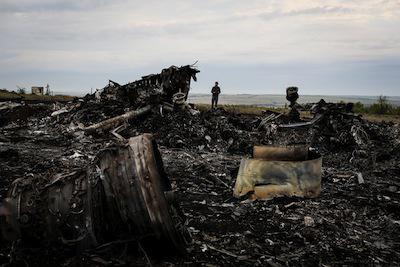
Communication in the 21st Century: A conversation with Tom Fletcher, author of Naked Diplomacy [Part II]
Dr Tristen Naylor, Oxford’s Lecturer in Diplomatic Studies, chatted with Tom Fletcher, the former British Ambassador and Downing Street foreign policy advisor, about his new book, Naked Diplomacy. In this three-part series their discussion explores everything from diplomacy in the digital era to the divide between academics and policy makers — with a nod to the intertextuality of W.H. Auden and Black Sabbath along the way. For Part I, see here. TF: In diplomacy, like any other trade, there are people who simplify and people who complicate. I tend to side with the simplifiers. TN: I can easily see that. Just taking the very start of your book as an example, you begin with W.H. Auden’s ‘The Embassy’, which so elegantly and simply …

The future of human rights in the UK
Adam Wagner (One Crown Row Ltd and founder of RightsInfo.org) gave a very timely seminar on Tuesday May 12 for the Oxford Human Rights Hub and the Oxford Martin School Human Rights for Future Generations Programme on the future of human rights in the UK under the new the Conservative majority government. The seminar asked two crucial questions: what will they do? And what can human rights activists do? What Will They Do? The Conservative Manifesto argues that the Human Rights Act, 1998 (HRA) should be scrapped and replaced with a British Bill of Rights based on “common sense,” but that is still consistent with the European Convention on Human Rights (ECHR). However, besides addressing some of the recent controversies …

The push and pull of the world’s most dangerous migration route – what’s really behind the flock of thousands to Europe these days?
The Mediterranean Sea is today’s most dangerous border between countries not at war with each other. Just last week, 300 persons departing Libya on four rubber dinghies have gone missing at sea, after drifting for days without food and water. News reports in the past six months have regularly commented upon the rising number of persons disembarking on Italy’s coastline – benefiting from its search and rescue operation Mare Nostrum. Despite the increase in new arrivals from 33,000 to 200,000, the life-saving mission has now been discarded. Italian policy makers believe Mare Nostrum is as responsible for overcrowded reception centres as it is for the rising number of persons risking their lives at sea. But is it truly to blame for the surge? Because more than 50 per cent of arrivals are either Syrian or Eritrean, news commentators have provided some other potential explanations. Some point to the protracted conflict in the Middle East, whilst others highlight the strain on neighbouring Jordan, Lebanon and Iraq in continuing to receive thousands of Syrian refugees. “Poverty in Africa” is mentioned occasionally, and for the better informed, an oppressive military regime and indefinite conscription in Eritrea are to blame. Yet these supposed ‘causes’ of the latest wave in irregular migration to Europe are speculative at most and have in fact been ongoing for many years now.
The irregular and mixed movement of persons across borders is arguably the most pressing international issue of our time, second perhaps only to terrorism. Yet the response of nations is too often reactionary and punitive towards individuals making the move, causing policies like Mare Nostrum to be cut short. By pinpointing the multiple ‘Push’ and ‘Pull’ factors at play in the regions concerned it is possible to generate fresh insight on the debate on South- North migration.
‘Push Factors’
For Syrians and Eritreans on the move, the situation at home is the key reason for flight. In Syria, there are immediate threats to life, regardless of which side of the conflict you are on. In Eritrea, an oppressive military regime and a lifeless economy force several thousand to walk across its land borders every month. Ruthless and indiscriminate conscription waves can also augment departures, as can changes in border surveillance, including the reported end to the notorious ‘shoot to kill’ policy.

Tweets: What ought to be their evidentiary value and legal status under international law?
On 18 July 2014 the world awakened to yet another tragedy: the downing of the Malaysian Airlines flight HM17 over pro-Russian separatist territory of Ukraine, which in its horrendous totality shocked the collective conscience of the public. Claims of responsibility for the tragedy spread over the then innocuous social media portal, Twitter, and instantly internationalized what had been perceived as a largely domestic conflict. What gradually came into view was the deployment of Twitter as a propaganda tool and a means for nefarious communication, subject to virtual deletion and emendation for the purposes of advancing a military objective and a political cause. References to tweets and videos bearing an imprint of responsibility were invoked in the Security Council’s emergency meeting hours later, where the US Ambassador to the United Nations, Samantha Power, cited them in her impassioned speech.
This raises a legal conundrum, namely, what is the legal status of a boastful Twitter confession by separatist leaders of a state-sponsored rebel group containing first-hand accounts and admissions of responsibility for shooting down a plane in the midst of a conflict? Are tweets a novel form of incriminating evidence in a rapidly changing terrain of modern warfare? What ought to be their evidentiary value and legal status under international criminal law, international law of armed conflict and international humanitarian law? Finally, what criminal liability should those claiming responsibility bear under domestic and international law?

How the death penalty is slowly weakening its grip on Africa
There is an observable trend towards the abolition of the death penalty in Africa. More than two thirds of African states have now either abolished the practice or have long-standing moratoria on its use. As of October 2014, seventeen African states have abolished the death penalty by enacting national legislation. A further twenty-five State Parties have not carried out an execution for ten years. Only twelve states retain the death penalty and have recently used it, with the majority of executions occurring in Somalia or Sudan.
This trajectory parallels an interpretation of international human rights law as progressively abolitionist. Although the International Covenant on Civil and Political Rights (ICCPR) made a provision for countries that had not already abolished the death penalty, it established stringent conditions under which it could continue. In those countries where it remains, international safeguards aim to ensure legality and fair trial, principles of equality and consistency, and minimum standards of protection for vulnerable groups, as well as entailing imposition only for the most serious crimes. Concurrently, the African Commission on Human and Peoples’ Rights is working to attach an Optional Protocol to the African Charter for abolition.
Despite these promising trends, it is important not to overlook the shadow that the death penalty still casts. Where it remains, the death penalty can be imposed for offenses that do not meet the international legal threshold of “most serious crimes”. The case of Meriam Ibrahim, sentenced to death for apostasy in Sudan, brought this issue to global headlines earlier this year. Similarly, the extensive remit of military tribunals in Somalia remains a concern.

Austerity and Euroscepticism: The End of EU Development Cooperation?
The financial crisis and its aftermath have brought to light the crisis of European integration, more precisely the crisis and potential demise of a certain approach to integration pursued since the early 1950s. The demise of an allegedly inevitable ‘ever closer Union’ pursued primarily in a technocratic way predates the turmoil which started in late 2008. The escalating struggle between European institutions and member states, buttressed by the rise of popular distrust, seems to emerge as one of the biggest challenges to European integration.
dev aidIn development cooperation, an area of ‘shared’ competences between the EU institutions and the member states, it has remained unexplored how economic recession, the sovereign debt crisis, austerity, the struggle in the eurozone and increasing Euroscepticism have affected the relationship between the EU and its member states.
EU aid has undeniably been affected. Significant cuts to bilateral aid budgets due to the consolidation of public finances have reduced member states’ willingness to pool further resources and competences in Brussels. Instead, member states have shown an increasing tendency to operate on their own or in like-minded groups, and focus on inward-looking aid policiesdriven by national interests and priorities.

Are we fighting a just war against the Islamic State?
This question is a little provocative so a clarification is in order. There is a distinction between whether a war is just (jus ad bellum) and whether it is being conducted in a just manner (jus in bello). In the case of IS it is incontrovertible that there is just cause for war. I have argued elsewhere that what is happening in IS occupied territory is attempted genocide. This legitimises military intervention, especially since the Iraqi government has requested help. What I wish to examine here is whether this war is being conducted justly.
Just war theory provides us with several principles that limit what is morally permissible in war. There are two principles that give us cause for concern when assessing the intervention against IS: proportionality and non-combatant immunity. The first of these is the idea that the means of war must be proportional to the ends. Soldiers should aim for victory, but this does not mean that victory can be pursued by any means necessary. There must be, to use Michael Walzer’s term, an ‘economy of force’ (Walzer, Just and Unjust Wars, 129-33). A general should not waste the lives of his soldiers in a bloody offensive when there are more economical means to victory. He should not resort to tactics that will produce longstanding bitterness and prolong the war (such as taking no prisoners).

Doom and gloom won’t do it: here’s how to sell the climate change message
Each of the 125 leaders attending the New York climate summit last week has been given four minutes to speak to the world. They (or their aides) may well have dipped into the climate literature to add scientific ballast to their speeches. But they may not be as familiar with the vast array of academic studies on effective communication about climate change.
They should be. If world leaders and climate advocates really want to improve the chances of mobilising political will and citizen action behind a new deal, they will need to think carefully about what sort of key messages actually work.
Clearly there is a balance to strike between doom-ridden messages and “bright-side” opportunities, and uncertainties around the science and the expected effects of climate change must be factored in too. Can risk language help?









